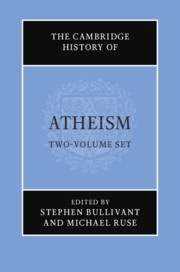Book contents
- The Cambridge History of Atheism
- The Cambridge History of Atheism
- Copyright page
- Dedication
- Contents
- Acknowledgments
- Contributors
- Introduction
- Part I Preliminaries
- Part II Atheisms in History
- 4 Pre-modern Japan
- 5 Ancient Greece
- 6 The Roman Empire
- 7 India: 1500 BC to AD 1200
- 8 Christian Europe
- 9 The Islamic World
- Part III Reformation, Renaissance, Enlightenment
- Part IV Classical Modernity: Philosophical and Scientific Currents
- Part V Classical Modernity: Social and Political Currents
- Part VI Twentieth and Twenty-First Centuries: Intellectual and Artistic Currents
- Part VII Lived Atheism in the Twentieth- and Twenty-First Centuries: Case-Studies
- Part VIII Emerging Atheisms in the Twenty-First Century
- Part IX Conclusion
- Index
- References
8 - Christian Europe
from Part II - Atheisms in History
Published online by Cambridge University Press: 25 September 2021
- The Cambridge History of Atheism
- The Cambridge History of Atheism
- Copyright page
- Dedication
- Contents
- Acknowledgments
- Contributors
- Introduction
- Part I Preliminaries
- Part II Atheisms in History
- 4 Pre-modern Japan
- 5 Ancient Greece
- 6 The Roman Empire
- 7 India: 1500 BC to AD 1200
- 8 Christian Europe
- 9 The Islamic World
- Part III Reformation, Renaissance, Enlightenment
- Part IV Classical Modernity: Philosophical and Scientific Currents
- Part V Classical Modernity: Social and Political Currents
- Part VI Twentieth and Twenty-First Centuries: Intellectual and Artistic Currents
- Part VII Lived Atheism in the Twentieth- and Twenty-First Centuries: Case-Studies
- Part VIII Emerging Atheisms in the Twenty-First Century
- Part IX Conclusion
- Index
- References
Summary
It has been a matter of controversy among historians whether there existed anything resembling the modern phenomenon of doxastic atheism in the medieval world (, 613). The reason for this is straightforward enough: there is no coherent body of literature on which to draw if one wants to give an account of atheism in medieval Latin Christendom. Although there is a variety of literature providing potential glimpses of what we might consider as possible examples of atheism in medieval life, there is no first-hand account from anyone expressing atheistic views that are unambiguously atheistic, and when others provide accounts of putative atheists, it is difficult to determine that they are atheists in a sense that twenty-first-century readers would recognize. If atheism is present, we will have to find echoes of it in the extant literature written by believers who had little or no direct interest in atheism as such.
- Type
- Chapter
- Information
- The Cambridge History of Atheism , pp. 139 - 158Publisher: Cambridge University PressPrint publication year: 2021
References
- 1
- Cited by



